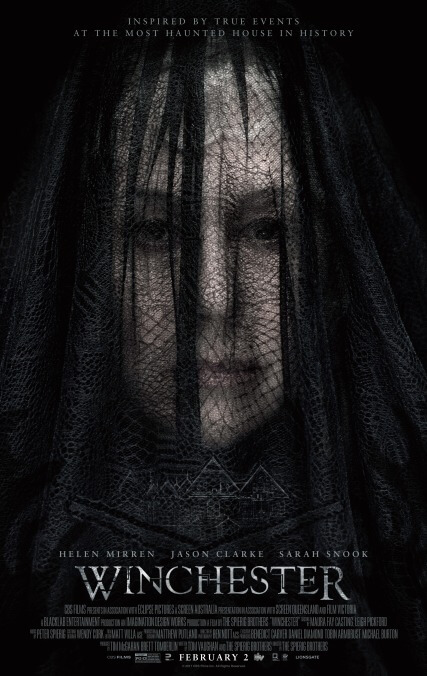Guns create ghosts in Winchester, a hokey horror misfire “inspired by actual events”

This much is indisputably true: Sarah Winchester, widow and heiress to the Winchester fortune, moved to San Jose, California in 1886, purchased an eight-room farmhouse, and proceeded to spend her vast inheritance transforming the property into an architectural wonder—a sprawling, seven-story mansion with winding hallways and staircases to nowhere, under constant construction by a team of carpenters that worked around the clock for years on end. Was she a rich eccentric with too much time and money on her hands, building without a blueprint? Or did something else compel her to turn her home into a confusing labyrinth of design flaws, a perpetual work in progress? Winchester, a new horror movie set and shot at the real Winchester Mystery House (it’s now a popular tourist destination), sits on a foundation of facts, then makes like its namesake and keeps remodeling, expanding into the realm of rumor, entertaining every wild theory surrounding the mighty manor. The wildest: that Sarah constantly tinkered with her home to appease the casualties of the family business, the spirits of everyone killed by a Winchester rifle.
Printing the legend is, of course, a totally viable strategy for any scary movie even nominally based in reality. Does the very shaky veracity of The Conjuring make it less of a shuddery good time? The problem with Winchester isn’t that it would drive the heiress’s biographer nuts, repeating such disputed hearsay as the notion that Mrs. Winchester went west only after speaking with a medium or that day-and-night construction on the house continued for 38 consecutive years, even after an earthquake leveled much of the property. (“Inspired by actual events” reads the opening text, stretching the definition of “inspired,” “actual,” or both.) No, the real problem is that all that speculative fun has been shaped into a rather clunky, derivative bit of supernatural claptrap: a haunted house movie curiously low on mystery or honest scares.
Set in 1906, the year of said quake, Winchester commences with the introduction of one Dr. Eric Price (Jason Clarke). He’s come to the vast eponymous estate at the behest of the Winchester Repeating Arms Company to assess the psychological state of the heiress (Helen Mirren), whose ongoing pet project—and her habit of roaming the twisting halls at all hours and in all black, like an apparition herself—has left the board concerned about her well-being, or perhaps just salivating at the opportunity to wrest away her 50-percent stake in the company. Although he arrives by carriage looking like Gary Oldman in Bram Stoker’s Dracula, complete with dark glasses and ostentatious hat, Price is a stubborn rationalist (“I do not believe in anything I cannot see,” he declares) and naturally responds with clinical skepticism to Sarah’s insistence that she’s been cursed by her livelihood and haunted by its victims. But then Price, who nurses a laudanum addiction and a traumatic gun-related backstory of his own, begins to see things, too.
There’s a whisper of comedy in Clarke’s performance, playing a man of science skulking around a haunted manor and constantly suppressing a freak-out, and a shadow of poignancy in Mirren’s regal remorse, even if she could probably summon it in her sleep, if not on her deathbed. But the film’s sibling directors, whose uneven résumé includes the entertaining sci-fi brain-bender Predestination but also last year’s work-for-hire franchise slop Jigsaw, don’t show much affinity for the bump-in-the-dark parlor games of Gothic horror. The Spierigs’ tricks are of the tired funhouse variety: pasty ghouls jump-scaring into mirrors or blurring past doorways, Sarah’s great-nephew (Finn Scicluna-O’Prey) gnashing and groaning with Exorcist-lite possession. For all the ominous overhead shots of the mansion, we never get much of a sense of its layout; maybe that’s an intentional reflection of the real property’s confusing structure, but it just leaves one grateful for the spatial clarity of a James Wan spookfest. Likewise, Winchester provides only a passing impression of the house’s architectural anomalies. If the current owners signed off in hopes that the film would drive tourist traffic, they got sold a bill of goods.
“The guilty, the innocent, the rifle doesn’t discriminate,” Sarah croaks at one point. But Winchester only feigns at anything resembling a gun-control message. There are just a few too many NRA talking points sprinkled throughout, characters nervously noting that firearms are only a problem when they fall into the wrong hands. Meanwhile, all the hand-wringing goes up in smoke by the preposterous climax, which comes close to declaring that the only thing that stops a bad ghost with a gun is a good guy with a gun. Ending with the insistence that the Winchester Mystery House is “one of the most haunted mansions in North America”—how such a thing is measured, the film doesn’t say—Winchester requires a rather dramatic suspension of disbelief, even for this genre. Ghosts we’ll accept. But a gun manufacturer tortured by guilt about gun violence? Citation needed.